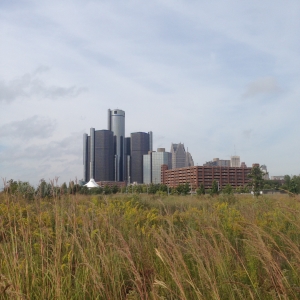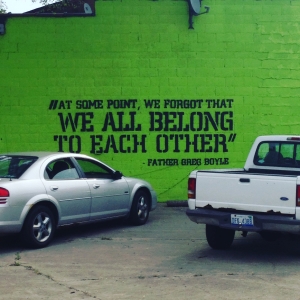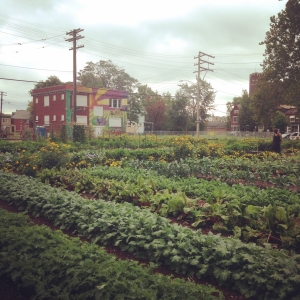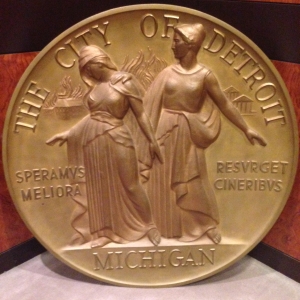If you had told me one year ago that I would be living and working in Detroit at this moment, I honestly would have started to freak out a little on the inside. I had never really heard anything about the city other than what the media had to report about crime, blight, and unemployment. Why would I want to go to a city that everyone seemed to be leaving? I loved living in the liberal bubble of Seattle the last four years and enjoyed the ability to walk virtually everywhere, visit dozens of coffee shops and bars, and live so close to farmers markets and retail centers of the downtown. With this comfortable lifestyle, how did I arrive at the decision to apply for Challenge Detroit? Two influential people from my time at Seattle University helped me to discover some of my passions that eventually inspired me to take the leap.

A view of the Renaissance Center from wetlands near the Riverwalk.
I spent the last two years working for the Seattle University Department of Grounds and Landscaping. Becki, the gardener/mentor for whom I worked, spent time teaching me about permaculture practices (utilizing natural patterns within design or social situations to create a self-sustaining system) and design elements within our landscape designs and mentioned how she uses the same principles within many of her social interactions. When pondering these ideas, I realized that all parts of a system contribute to the productivity of the entire system. If one piece fails, the whole system fails.
I began to see this pattern throughout my experiences and interactions with friends, colleagues, and project teams for course work. Last winter, I had two courses from one of my favorite professors, Doc Wong. Her courses are heavily project and experience-based. Our housing and urban development class discussed the history of housing and housing policy in the United States and how these policies have contributed to many of the ongoing oppressive social structures and racial issues we experience to this day. Our American city course allowed us to analyze how cities operate and to decipher the elements of a city that make it thrive (or not). The class had the opportunity to visit the Seattle Center, take a walking tour of the downtown skyscrapers, experience the multilevel Pike Place Market, tour Safeco field where the Mariners play, and visit the observation deck of the Smith Tower.
The combination of my passions for systems/future- oriented thinking along with the urban experience, led me to seriously consider applying for the Challenge Detroit fellowship after receiving an email with details from my program advisor. Detroit is a city on the rise that requires a lot of TLC. I can see a great benefit as someone coming to the city with a fresh pair of eyes in collaboration with Detroit and Michigan natives who have already experienced the city. During my short time here, I have already noticed a sense of Detroit pride. People love to tell their story of how they survived some very difficult economic times while continuing to struggle under failing social structures that mainly benefit rich, white people. I have never seen so much endurance and overall gratitude toward life.

Lindale Gardens neighborhood.
As I am beginning to explore the city, one major thing that sticks out to me is all of the efforts being poured into the downtown. While I agree that the city must have a healthy heart/core, Detroit’s vulnerable and poor populations live in the neighborhoods. I am excited to be part of Challenge Detroit, as our cohort will be working with local nonprofits in neighborhoods to help their revitalization efforts. Some of the non-profit partner challenges might include small business development, housing issues, and food security issues with urban agriculture. We cannot have a healthy, thriving city unless we consider every piece of it. I strongly believe that Detroit cannot come back solely from Dan Gilbert’s ventures but that any meaningful, long-term change requires collaboration from private, public, and non-governmental agencies in addition to community members. Multiple perspectives and worldviews amount to more holistic solutions from which anyone and everyone can benefit. I feel very fortunate to be part of a skillfully diverse cohort with Challenge Detroit in which we can continue to make positive strides in the right direction for a thriving Detroit. As a primarily white cohort (and as a white male) entering neighborhoods of color, we must be sensitive to the needs of the communities instead of inflicting our values and beliefs into a particular situation that most of us in the cohort do not fully understand. I recognize that it’s not my turn to speak. Through this program we listen to and advocate for the voices of the people who matter, the people who have lived under systems of oppression for far too long. It’s time to break away from the status quo. It’s time for community-based solutions based on local issues that directly affect people living in individual neighborhoods and in the city as a whole. This year, we join the ranks of heroes and champions who have already made great progress on issues surrounding housing, food security, other basic needs, small business growth, and education in Detroit.

Volunteer opportunity at the Michigan Urban Farming Initiative.
Our first challenge has the cohort compiling a small business directory for each of the city’s seven districts. Many businesses do not have the marketing abilities to get their name out into the city. Our goal is to have each business’ information in a print or online format so that people across the city as well as visitors to the city can more easily educate themselves in the types of services and businesses that the neighborhoods have to offer. We have a lot of work to do!

Getting ready to work with the City of Detroit!
